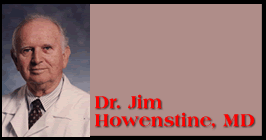Other
Howenstine Articles:
Use of CoQ10
to Treat Malignancies
Why You Should Avoid Taking Vaccines
THYROID HORMONE THERAPY APPEARS TO CAUSE BREAST CANCER
By Dr. James
Howenstine, MD.
July 27, 2006
NewsWithViews.com
Medical journals and textbooks typically portray iodine as an unimportant substance which should be taken in small amounts[1] because of it's dangers. Actually approximately one third of humanity has iodine deficiency.
When humans lack iodine the thyroid gland enlarges (goiter), nodules appear in the thyroid gland and over a period of time cancer may appear in a thyroid nodule. Conventional medicine treats thyroid gland enlargement with thyroid hormone without considering the possibility that the hypothyroidism and goiter may be due to lack of iodine. This failure to diagnose and treat iodine deficiency can lead to an increased risk of breast cancer and the longer the diagnosis is missed the greater the chance that breast cancer will occur. Women taking thyroid hormone appear to be twice (12.1%) as likely to develop breast cancer as women not using thyroid hormone (6..2%). Women who had taken thyroid hormone for 15 years had a 19.5% incidence of breast cancer whereas women who have only taken thyroid hormone for 5 years had only a 10% incidence of breast cancer. Why is this?
The essential trace element iodine may be the most important least publicized mineral in existence. Iodine is the only element needed in hormones and in the production of hormones. The iodine containing hormones are involved in the creation of embryos, development of brain function, growth, metabolism and maintenance of body temperature. This means that proper amounts of thyroid hormone, estrogen, progesterone, testosterone, insulin, growth hormone etc. can not be made when iodine is lacking from the body. One third of all individuals on Earth are functioning with subnormal levels of iodine. Low intake of iodine is the leading cause for intellectual deficiency in the world.
There is strong evidence that iodine lack predisposes to breast cancer. One out of seven women in the U.S. has deficiency of iodine proven by urine iodine screening tests (urine I less than 50 ug/L). This is the same incidence for breast cancer seen in U.S. women. Without bothering to check urine for iodine, physicians visited by a woman with a goiter or symptoms of hypothyroidism are routinely prescribing thyroid hormone therapy.
Hintze et al[2] compared the results of 400ug/L of Iodine with 150ug of T4 (synthyroid) for 8 months and then four months after stopping therapy. The results clearly favored iodine therapy. Both treatments led to similar suppression in the size of the goiter. However, four months later the size of the thyroid had returned to pre-treatment levels in the group treated with T4 hormone. The group who had received iodine therapy continued to have normal sized thyroid glands four months after therapy was stopped. Several investigators have concluded that iodine lack is a probable cause for breast cancer in women.[3] [4] [5] [6] [7]
Demographic studies in Japan and Iceland revealed that both countries have a high intake of iodine and low incidences of goiter and breast cancer. In Mexico and Thailand where iodine intake is low there is a high incidence of goiter and breast cancer.[8] Thyroid gland size measured by ultrasound is significantly larger[9] in Irish women with breast cancer than control women.
Administration of thyroid hormone to iodine deficient women appears to increase the risk of developing breast cancer. In a group of women undergoing screening mammograms the incidence of breast cancer[10] was twice as high in the women taking thyroid hormone. for hypothyroidism (probably caused by iodine lack) than in women not taking thyroid supplements. The mean incidence was 6.2% in controls and 12.1% in women on thyroid hormones. The incidence of breast cancer was twice as high in women taking thyroid hormone for more than 15 years (19.5%) compared to those on thyroid hormones for only 5 years (10%).
In the state of Michigan, during a period of iodine supplementation in bread (1924-1951) the prevalence of goiter diminished from 38.6% to 1.4%. Of interest the incidence of breast cancer remained unchanged during this time frame. This information was used to suggest that iodine supplementation had no effect on the incidence of breast cancer. However, Ghent and Eskin were able to show in women and female rats that the amount of iodine needed to protect against fibrocystic disease of the breast and breast cancer was at least 20 to 40 times greater[11] than the iodine needed to control goiter.
In the 1960s mandated iodine containing dough was equivalent to the RDA of 150 ug per slice of bread. At that time the incidence of breast cancer was only 1 in 20.[12] In the past 20 years the use of iodine supplementation in bread was eliminated and a goiter producing substance toxic to the thyroid gland (bromine) was introduced as replacement for iodine. The risk for breast cancer is now 1 in 8 and this risk is increasing by one percent[13] each year. The decision to replace iodine in an iodine deficient population with a goitrogen was illogical lacking in common sense. The damaging effects of bromine on thyroid tissue also appears to contribute to the development of auto-immune diseases in the thyroid gland (Hashimoto's thyroiditis).
The mammary glands have a trapping system for iodine similar to that of the thyroid gland. The breasts effectively compete with the thyroid gland for ingested iodine. This distribution of iodine to both breast and thyroid gland in pubertal girls explains why goiter is 6 times more common in girls than pubertal boys. The disappearance of iodine into breast tissue in women leads to decreased ability to supply the thyroid gland with an adequate amount of iodine. The development of a goiter in young girls indicates deficient distribution of iodine to both breast and thyroid tissue. Treating such a patient with thyroid hormone is not sensible and appears to increase the risk of breast cancer.
Study of radioiodine uptake in normals and women with fibrocystic breast disease FDB reveals that the FDB breasts were able to take in 12.5% of the iodine dosage compared to only 6.9% in normal breasts. This proves the existence of considerable iodine depletion in the breasts of women with FDB.
There is considerable evidence for an increased risk of thyroid cancer as well as breast cancer in persons with iodine deficiency. Untreated iodine deficiency leads to goiter, thyroid nodules and eventually some of these nodules become malignant. The decreasing intake of iodine has resulted in an increase in thyroid nodules and increase in thyroid cancer. In 2001 there were 19,500 new cases of thyroid cancer in the U.S. with 14,900 of these cases occurring in women.
Iodine has a role in promoting general well being as well as protecting against infections, degenerative diseases and cancer. Iodine promotes the normal killing of defective and abnormal cells (apoptosis). Thus, iodine helps the body's surveillance system to detect and remove abnormal cells. Additionally, the presence of iodine triggers differentiation away from the more dangerous undifferentiated type of cell toward normal cells. The presence of adequate levels of iodine in the body (Japanese diet with lots of sea vegetables and fish) reduces reactive oxygen species (ROS). in the body which decreases the oxidative burden in the body This results in slowing of degeneration disease processes and decreasing the risk of cancer.
Nearly every physician in the United States will reach for a prescription pad to order thyroid hormone when he sees a patient with goiter or symptoms of hypothyroidism. This can be exactly the wrong thing to do if the patient has deficient stores of iodine. Insist on obtaining a 24 hour urine collection for iodine to eliminate iodine lack as the cause for your symptoms (values below 50 ug/liter are abnormal). Thyroid hormone therapy in the presence of iodine deficiency increases the risk of breast cancer and probably thyroid cancer as well. Endocrinologist, Dr. Guy Abraham, formerly of the U.C.L.A. Department of Endocrinology, is convinced that everyone needs to be on iodine therapy until their iodine stores have been fully restored. After this time frame periodic intake of iodine will help insure that the many body functions requiring iodine run smoothly.
|
Subscribe to the NewsWithViews Daily News Alerts! |
A dosage of two tablets of Iodoral twice daily for three months followed by one Iodoral tablet daily for a year will restore iodine stores for most persons. At that point periodic taking of an Iodoral tablet daily one month out of 4 to 6 months etc. will be adequate to maintain iodine stores. Iodine stores can be easily monitored by taking 4 Iodoral tablets (50 mg iodine) and collecting a 24 hour urine sample for iodine content. If 80% of the ingested iodine is found in the urine collection the iodine stores are normal. Iodoral can be obtained from Optimox Corp. Torrance, Cal. To purchase a referral from a health care practitioner is needed.
Footnotes:
1,
Abraham, Guy F. et al Orthoiodosupplementaion: Iodine Sufficiency Of
The Whole Body pg 1
2,
Hintze, G. et al treatment of Endemic goiter due to iodine deficiency
with iodine, levothyroxine or both:results of a multicentre trial.
European Journal of Clinical Investigation, 19:527-534, 1989
3,
Eskin B et al Mammary Gland Dysplasia in Iodine Deficiency JAMA ,
200:115-119. 1967
4,
Eskin B Iodine and Mammary Gland Cancer Adv. Exp. Med. Biol.,
91:293-304, 1977
5,
Ghent, W. et al Iodine Replacement in Fibrocystic disease of the Breast
Can. J. Surg. , 36:453-460, 1993
6,
Eskin B. et al Different Tissue Responses for Iodine and Iodidein Rat
Thyroid and mammary Glands Biol. Trace Element Research 49:9-19, 1995
7,
Derry , D Breast Cancer and Iodine Trafford Publishing, Victoria B.C. ,
92, 2001
8,
Finley JW., Bogardus, G.M., Breast Cancer and Thyroid Disease Quart.
Review Surg. Obstet. Gyn. 17:139-147, 1960
9,
Smtyhe, P. , Thyroid Disease and Breast Cancer J. Endo. Int. ,
16:396-401, 1993
10,
Ghandrakant, C. et al Breast Cancer Relationship to Thyroid Supplements
for hypothyroidism JAMA, 238:1124, 1976
11,
Backwinkel, K., Jackson, A.S. Some Fearures of breast Cancer and
Thyroid Deficiency Cancer17:1174-1176 , 1964
12,
Epstein, S.S., Sherman, D. Breast Cancer Prevention Program Macmillan ,
NY. 1998 pg 5
13,
Ibid
© 2006 Dr. James Howenstine - All Rights Reserved
Sign Up For Free E-Mail Alerts
E-Mails are used strictly for NWVs alerts, not for sale
Dr. James A. Howenstine is a board certified specialist in internal medicine who spent 34 years caring for office and hospital patients. After 4 years of personal study he became convinced that natural products are safer, more effective, and less expensive than pharmaceutical drugs.
This research led to the publication of his book A Physicians Guide To Natural Health Products That Work. Information about these products and his book can be obtained from amazon.com and at www.naturalhealthteam.com and phone 1-800-416-2806 U.S. Dr. Howenstine can be reached by mail at Dr. James Howenstine, C/O Remarsa USA SB 37, P.O. Box 25292, Miami, Fl. 33102-5292.
E-Mail:
dr.jimhow@gmail.com
Nearly every physician in the United States will reach for a
prescription pad to order thyroid hormone when he sees a patient with
goiter or symptoms of hypothyroidism. This can be exactly the wrong
thing to do if the patient has deficient stores of iodine.












